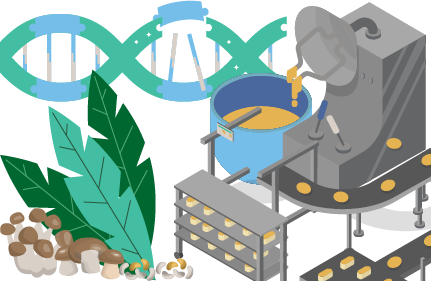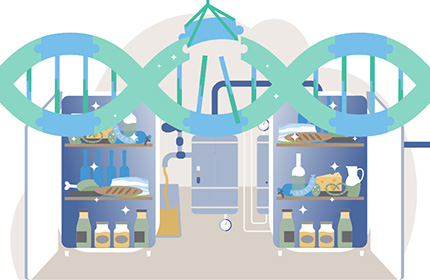Microbial Biotechnology for Novel Foods Webinar Series
-

July 9, 2020-July 17, 2020
11:00 am - 12:30 pmOECD Boulogne Offices (Virtual)
Paris, France
Background
Food ingredients are an essential part of the global food supply and international trade. Microbial fermentation is used to make purified flavors, vitamins, amino acids, and other compounds for the food industry. Food producers around the world use microbe-derived products because they provide yield, purity, cost competitiveness advantages, and potential resource conservation.
Microbial biotechnology, including techniques other than genetic engineering, is one technology used to produce products of microbial fermentation. In the food industry, it is used to produce a range of foods, beverages, and their ingredients. Ingredients derived from microbial biotechnology include:
- enzymes used to make wine, cheese, beer, and processed products ranging from baked goods to sauces,
- vitamins used to make infant formula similar to human milk and wellness-enhancing products, and
- food additives for seasoning, flavoring, coloring, or thickening, including those used for plant-based meat products, and many other applications.
Supported by a grant from the New Technologies and Production Methods Division at the U.S. Department of Agriculture (USDA) Foreign Agricultural Service (FAS) Trade Policy and Geographic Affairs (TPGA) area, the Agriculture & Food Systems Institute organized the Microbial Biotechnology for Novel Foods Webinar Series to discuss the history and opportunities of microbial biotechnology for novel foods. With four sessions taking place between July 9-17, 2020, this online event began with an exciting plenary talk on the history and future of microbial technology, followed by three discussion sessions guided by experts in the field.
Agenda
| Date | Webinar |
| Thursday, July 9, 2020 11:00-12:00 EST |
Plenary Talk: History and Future of Microbial Biotechnology for Novel Food Dr. Jonathan McIntyre Chief Executive Officer, Motif FoodWorks, Inc. |
| Monday, July 13, 2020 11:00-12:30 EST |
Discussion 1: The Science of Microbial Products of Biotechnology Dr. Vincent Sewalt Senior Director, Regulatory Science & Advocacy, DuPont Nutrition & Biosciences |
| Wednesday, July 15, 2020 11:00-12:30 EST |
Discussion 2: Industry and Consumers of Products Derived from Microbial Biotechnology Dr. Elke Duwenig Senior Expert, Global Regulatory/Public & Government Affairs – Biotechnology, Nutrition & Health, BASF SE, Germany |
| Friday, July 17, 2020 11:00-12:30 EST |
Discussion 3:Trade of Food Products Derived from Microbial Biotechnology Dr. Paul Hanlon Director of Regulatory Affairs, Abbott Nutrition |
Overview
The first webinar featured a keynote presentation from Dr. Jonathan McIntyre, who brought more than 25 years of experience at the nexus of science and consumer products to bear in order to set the stage for robust discussions of this dynamic but often overlooked field. The program continued with three additional webinars designed to foster insightful discussion on a range of topics that are critical to understanding the role of microbial biotechnology and derived food ingredients in trade. As part of these programs, three industry leading speakers prepared short discussion papers that were provided in advance of the webinars. Participants were asked to read these short discussion papers prior to the event, as they served to facilitate the guided discussions, which were the cornerstone of the program.
The aim of this webinar series was to convene scientists and stakeholders with a background in food safety and biotechnology from a variety of sectors, including academia, industry, and governments, to raise awareness and foster a shared understanding of the nature of products derived from microbial biotechnology. Guided discussions shed light on safety standards, how the regulatory framework impacts trade, the prospective of the global market for these products, as well as communication around low-risk, well-characterized food and food ingredients derived from biotech microbes, algae, and fermented products. The outcomes from the webinars will be used to inform future activities, including policy discussions and outreach efforts intended to enhance science-based regulatory frameworks that ultimately facilitate trade.
The webinar series was organized following the postponement, as a result of the COVID-19 global emergency, of the in-person Workshop on Microbial Biotechnology for Novel Foods, which was set to take place in space provided by the OECD Boulogne Offices on March 25-26, 2020.
Plenary Talk: History and Future of Microbial Biotechnology for Novel Food
Dr. Jonathan McIntyre
Chief Executive Officer, Motif FoodWorks, Inc.
Thursday, July 9, 2020, 11:00-12:00 EST
Microbial biotechnology has been used to produce food and foods ingredients for over two decades. However, new products such as plant-based meats, animal-free milk and eggs, and novel probiotics have raised the public profile on the role the microbial biotechnology plays in the development of novel foods. This dynamic plenary talk addressed the history and future of microbial biotechnology for novel food and provided the framework for the following three discussion-based webinars of the series.
Topics covered in this webinar included:
- a history of the practice of fermentation in food production,
- the advent of biotechnology and its benefits,
- microbial biotechnology for the food industry, and
- technological advancements for new food applications.
Discussion 1: The Science of Microbial Products of Biotechnology
Dr. Vince Sewalt
Senior Director, Regulatory Science & Advocacy, DuPont Nutrition & Biosciences
Monday, July 13, 2020, 11:00-12:30 EST
Food enzymes produced with genetically engineered microbes are commonly used in food production. Dr. Vincent Sewalt provided a compelling presentation on the basic science of improving microbes for contained use fermentation to produce food ingredients and enzymes, and the safety assessment considerations for these food substances produced with microbial biotechnology. Techniques used to modify microbes and the use and safety of genetically engineered microbes in food manufacturing were presented, along with the future outlook of this evolving technology, implications for safety, and additional benefits that this technology could provide. Prior to attending the webinar, participants were asked to read a short discussion paper, which provided insights into the science of microbial biotechnology and areas of potential discussion. A large component of the webinar was a facilitated discussion around the use of microbial biotechnology in the development of novel food and food ingredients.
Discussion 2: Industry and Consumers of Products Derived from Microbial Biotechnology
Dr. Elke Duwenig
Senior Expert, Global Regulatory/Public & Government Affairs - Biotechnology, Nutrition & Health, BASF SE, Germany
Wednesday, July 15, 2020, 11:00-12:30 EST
Microbial biotechnology is accelerating the transition towards a sustainable food system that addresses the need for increased food and nutritional security while also reducing the environmental impact. Despite their importance, ingredients derived from microbial biotechnology are seen as a “hidden” part of the food industry, to preferably be avoided. Dr. Duwenig discussed how consumer desires for food and voluntary food labels impact decision-making in the food industry, followed by how transparency, public education, and applying principles of fair and science-based communication and marketing across the entire industry and value chain can help avoid future misunderstandings on the use of microbial biotechnology in food. Prior to attending the webinar, participants were asked to read a short discussion paper, which provided insights into the science of microbial biotechnology and areas of potential discussion. A large component of the webinar was a facilitated discussion around public perception of food, food labels, and how public education and fair and transparent communication surrounding microbial biotechnology for novel foods is needed.
Discussion 3: Trade of Food Products Derived from Microbial Biotechnology
Dr. Paul Hanlon
Director of Regulatory Affairs, Abbott Nutrition
Friday, July 17, 2020, 11:00-12:30 EST
Novel foods derived from microbial biotechnology are becoming more common in the food supply, requiring regulatory agencies to develop processes for the scientific evaluation of these food substances and developing/modifying regulatory frameworks that control the labelling of foods produced using these technologies. Dr. Hanlon introduced how the lack of alignment on the processes and frameworks already developed and in the process of being developed to manage GEM-produced food substances has the potential to create non-tariff trade barriers, impose additional regulatory challenges, and lead to supply chain challenges. Prior to attending the webinar, participants were asked to read a short discussion paper, which provided insights into the science of microbial biotechnology and areas of potential discussion. A large component of the webinar was a facilitated discussion on how development of harmonized solutions is critical to ensuring that the control of microbial biotechnology-derived food substances remains aligned with the goals of food control mechanisms, including ensuring safety, communicating clearly to consumers, and developing a sound foundation for trade.



